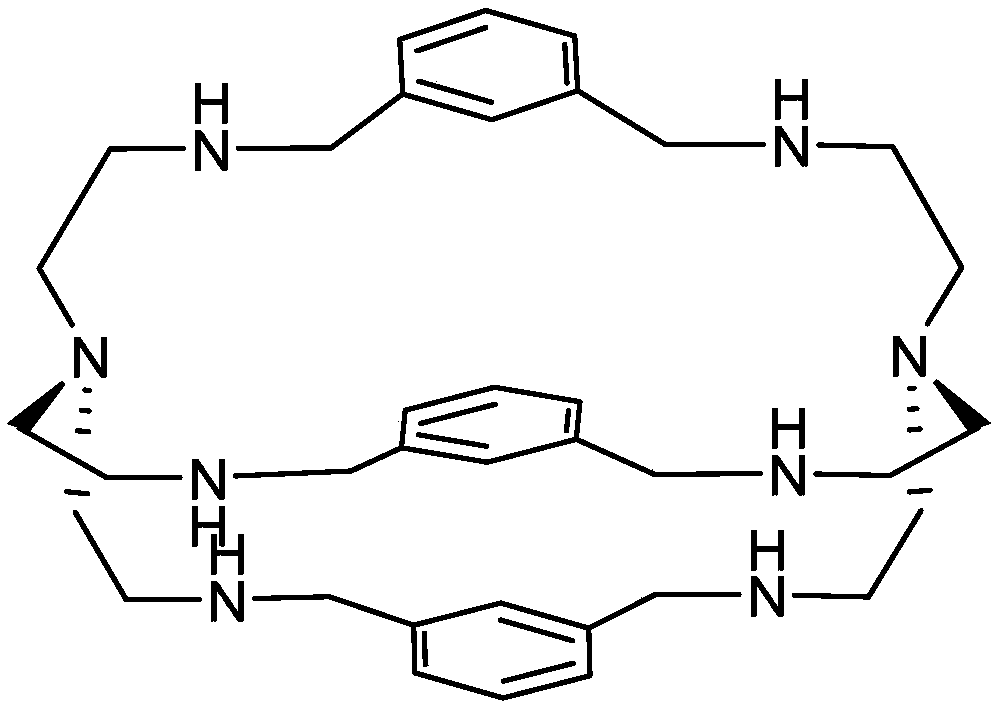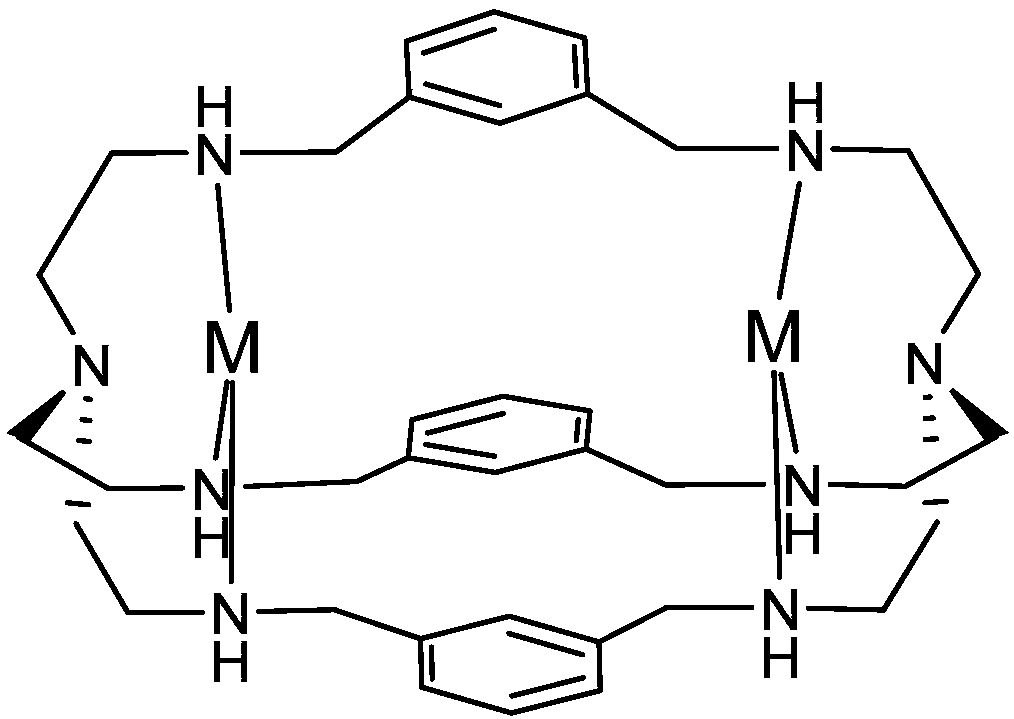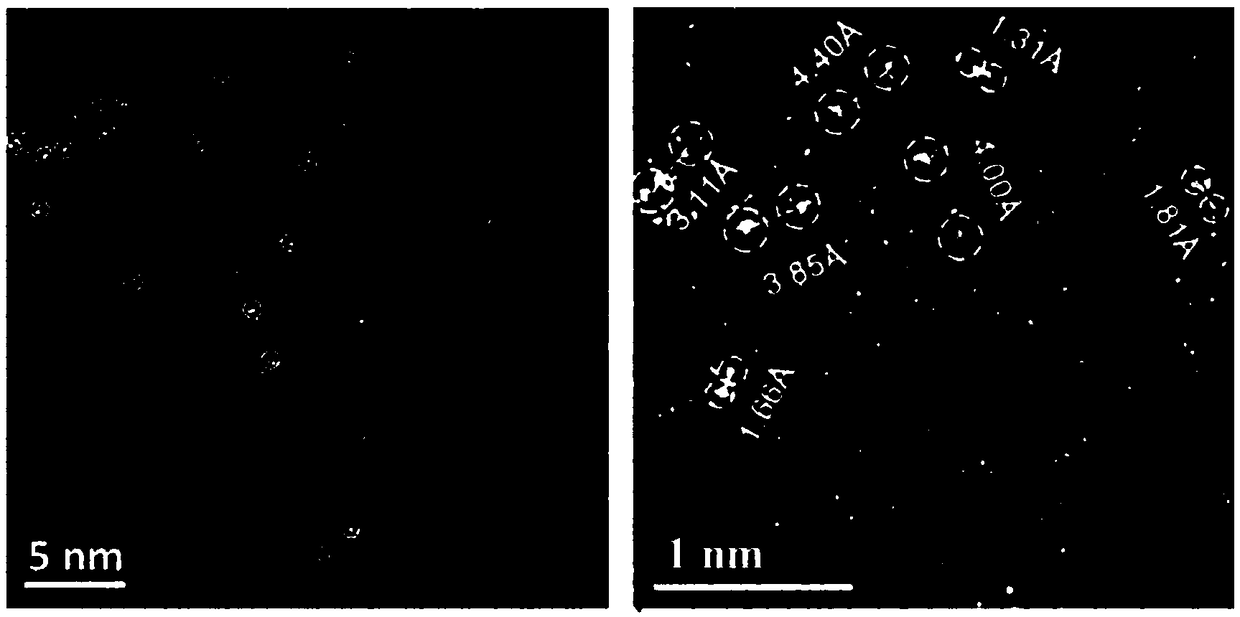Method for preparing monoatomic catalysts
A catalyst and atom technology, applied in the field of materials science and engineering, can solve the problems of mismatching the size of single-atom catalysts and reaction substrates, lack of electronic or spatial synergy, and small size of a single metal atom, and meet the requirements of experimental diversification. , to achieve accurate and controllable, reduce the effect of experimental requirements
- Summary
- Abstract
- Description
- Claims
- Application Information
AI Technical Summary
Problems solved by technology
Method used
Image
Examples
Embodiment 1
[0033] Preparation of organic cryptand molecules: Weigh an appropriate amount of tris(2-aminoethyl)amine and m-phthalaldehyde into a round-bottomed flask filled with acetonitrile solution, stir until completely dissolved and mix, and continue stirring for a certain period of time. Filtration and washing yielded an intermediate product. Finally, through reduction, extraction, drying and other steps to obtain organic cryptand molecular products (such as figure 1 ).
[0034] transition metal precursors (such as figure 2 ) preparation: Weigh an appropriate amount of organic cryptand molecules and copper perchlorate hexahydrate and dissolve them in acetonitrile solution, mix and stir for a certain period of time after being completely dissolved, and obtain copper precursor products after filtering, washing and drying.
[0035] Weigh 0.02g of the mixture of copper precursor and 1g of carbon black and add it into a 50mL agate ball mill jar, put some agate balls in the jar, put the...
Embodiment 2
[0037] Preparation of organic cryptand molecules: Weigh an appropriate amount of tris(2-aminoethyl)amine and m-phthalaldehyde into a round-bottomed flask filled with acetonitrile solution, stir until completely dissolved, then mix, and continue stirring for a certain period of time. Filtration and washing yielded an intermediate product. Finally, the organic ligand molecular product is obtained through reduction, extraction, drying and other steps.
[0038] Preparation of transition metal precursors: Weigh appropriate amount of organic ligand molecules and copper perchlorate hexahydrate and dissolve them in acetonitrile solution, mix and stir for a certain period of time after complete dissolution, and obtain copper precursor products after filtering, washing and drying.
[0039] Weigh 0.06g of the mixture of copper precursor and 3 g of carbon black and add it into a 100mL agate ball mill jar, put a number of agate balls in the jar, put the agate ball mill jar into the planeta...
Embodiment 3
[0041] Preparation of organic cryptand molecules: Weigh an appropriate amount of tris(2-aminoethyl)amine and m-phthalaldehyde into a round-bottomed flask filled with acetonitrile solution, stir until completely dissolved, then mix, and continue stirring for a certain period of time. Filtration and washing yielded an intermediate product. Finally, the organic ligand molecular product is obtained through reduction, extraction, drying and other steps.
[0042] Preparation of transition metal precursors: Weigh appropriate amount of organic ligand molecules and copper perchlorate hexahydrate and dissolve them in acetonitrile solution, mix and stir for a certain period of time after complete dissolution, and obtain copper precursor products after filtering, washing and drying.
[0043] Weigh 0.2g of the mixture of copper precursor and 10g of carbon black and add it into a 250mL agate ball mill jar, put some agate balls in the jar, put the agate ball mill jar into the planetary ball ...
PUM
| Property | Measurement | Unit |
|---|---|---|
| Volume | aaaaa | aaaaa |
Abstract
Description
Claims
Application Information
 Login to View More
Login to View More - R&D
- Intellectual Property
- Life Sciences
- Materials
- Tech Scout
- Unparalleled Data Quality
- Higher Quality Content
- 60% Fewer Hallucinations
Browse by: Latest US Patents, China's latest patents, Technical Efficacy Thesaurus, Application Domain, Technology Topic, Popular Technical Reports.
© 2025 PatSnap. All rights reserved.Legal|Privacy policy|Modern Slavery Act Transparency Statement|Sitemap|About US| Contact US: help@patsnap.com



